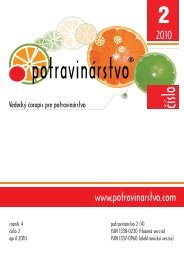Create successful ePaper yourself
Turn your PDF publications into a flip-book with our unique Google optimized e-Paper software.
INTRODUCTION<br />
It is a life's necessity, as it satisfies the basic needs of the<br />
organism, eliminates the feeling of hunger and thirst,<br />
positively affects well-being, ability of learning and<br />
efficiency of work (Niclas et al., 2001; Jackiewicz, 2007).<br />
The nutrition of children is undeniable linked with the<br />
condition of their organisms in adulthood. Proper nutrition<br />
from an early age gives the chance to reach the opportunity<br />
of genetically-based physical and intellectual development<br />
(Hamułka et al., 2003). In addition, well-balanced diet<br />
can prevent certain civilization diseases or cause their<br />
milder course. In Poland there are 40% of children who<br />
attend kindergarten, where they spend from six to eight<br />
hours a day. Meals, which are given to preschoolers are a<br />
base of their daily dining, therefore it is extremely<br />
important for children to be given meals which are<br />
wholesome, well balanced, providing energy and<br />
nutritients in appropriate proportions (Leszczyńska et al.,<br />
2007, Kozioł-Kozakowska, Schlegel-Zawadzka, 2007).<br />
The aim of this work was to assess the energy value and<br />
nutritional quality of food received by children, based on<br />
the method of calculation, and determination of the<br />
reasonableness tested meals given in kindergarten based<br />
on the point of qualitative analysis methods.<br />
MATERIAL AND METHODS<br />
Material for the work was food rations for consumption by<br />
preschool children (4-6 years) who attend to the<br />
kindergarten in Koszalin. Rations analyzed included four<br />
meals: I breakfast, II, breakfast, lunch and afternoon tea,<br />
meals consumed at home were not being evaluated. The<br />
ration were collected in a decade system in spring (March,<br />
April and May 2009). In total, 30 reasons were analyzed.<br />
The energy value, protein content, fat and carbohydrates<br />
were calculated on data collected using the "Dietetyk" and<br />
"Jadłospis w przedszkolu" (Polish software for<br />
dietetycians). The results of calculations of the nutritional<br />
value of food, as recommended by the National Institute of<br />
<strong>Potravinárstvo</strong><br />
VYHODNOCOVANIE ENERGETICKEJ HODNOTY MENU PRE DETI<br />
V POĽSKÝCH MATERSKÝCH ŠKOLÁCH<br />
EVALUATION OF ENERGY VALUE FROM KINDERGARTEN MENU OF POLISH<br />
CHILDREN<br />
Maria Dymkowska-Malesa, Weronika Woźniak, Janusz Zakrzewski, Krystyna A. Skibniewska<br />
ABSTRACT<br />
Abstract: A proper diet has a huge impact both on human growth and maintaining a good physical and psychological wellbeing.<br />
The paper presents assessment of correctness and quality of menu in a kindergarten in Koszalin, Poland. Contents of<br />
protein, energy, fat and carbohydrate were calculated in 30 daily food rations. Their quality was also assessed. Very high<br />
irregularities were noted in relation to standards, the consumption of energy, protein and carbohydrates, which may lead to<br />
irregular food/eating habits in the adulthood. The results indicate the need for nutrition education among workers of<br />
kindergartens.<br />
Keywords: nutrients, kindergarten, food rations, nutritive value<br />
Food & Nutrition, were reduced: 10% of the energy value<br />
and contents of fat,carbohydrate and protein were reduced.<br />
In addition, food rations have been studied in qualitative<br />
terms, using the method of Starzynska [Gawęcki,<br />
Hryniewiecki 1998]. The collected data were compared<br />
with the nutrition standards for children aged 4-6 years.<br />
RESULTS AND DISCUSSION<br />
The results of the energy value and nutrient content and<br />
the percentage of protein, fat and carbohydrates in the total<br />
amount of energy meals are presented in Table 1, and the<br />
average percentage coverage of pre-board standards for<br />
energy and nutrients in Table 2.<br />
It is considered that pre-school food should cover 70% of<br />
the daily amount of energy and nutrients recommended for<br />
children ages 4-6 years. Energy value and content of<br />
nutrients in the tested rations was in a wide range, as<br />
shown in Table 1. The recommended energy needs of the<br />
tested population in Poland is 1500-1900 kcal, average of<br />
which is 1700 kcal and the meals served in the<br />
kindergarten should provide 1190 kcal (70%). The energy<br />
value of the surveyed meals was 1358.65 (Table 1) which<br />
represents 114.17% of the recommended standards (Table<br />
2), so the average dietary ration supplied 14% energy more<br />
than the recommended norm.<br />
Similar observations have been made by other authors.<br />
Kłos and Bertrand [1999] studied the nutritional value of<br />
food and energy spent in military pre-schools in Warsaw.<br />
The meals contained an average of 1541 kcal, which<br />
represents 129% of the recommended standards. Grajeta<br />
et al. [2003] examined the energy value of kindergarten<br />
meals in Wroclaw, they showed that the figure was an<br />
average of 1367 kcal and covered in 115% of the<br />
recommended standard. Czech and Kęska [2007]<br />
examined the content of nutrients in the kindergarten<br />
rations in Lublin and have shown that meals contained<br />
average 1346 calories which is 113% of the recommended<br />
standards.<br />
ročník 4 50 1/2010






